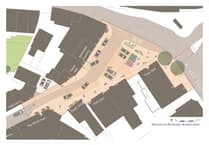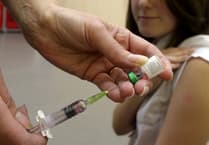Tucked away at Manor Farm, Stratton-on-the-Fosse, is the home of Rob, a fourth generation farmer, and Suzanne Addicott, who has a background of working with vulnerable adults.
The couple converted old outer dairy buildings into offices for individual businesses and in 2015, this was twinned when they launched an innovative project created out of a partnership with Mendip District Council, Addicott Partners (Manor Farm) and the Elim Connect Centre, Wells. From there, the Dairy House initiative was born on the Duchy farm.
In 2018, the centre won funding from the Somerset Community Foundation to launch a Community Interest Company, with any profits going towards ending homelessness.
The Dairy House operates as a community house to support vulnerable adults who have found themselves homeless and/or with an addiction. It is open to people from all around the area, and stands as a ‘dry house,’ so that people are able to work through addiction by being able to focus their time on working within a farm environment.
The house allows up to seven people to stay at a time for a maximum of twelve weeks, which enables residents to focus themselves holistically for the next steps in life after leaving the farm. Their valuable time there assists in helping residents re-establish and rebuild their lives for the future.
Whilst staying at the Dairy House, the residents cook and eat together, and engage in a number of structured activities and programmes to teach them how to have a sustainable future. As part of this treatment, a community garden was developed, called ‘Root Connections’, which enables residents and volunteers from the local community to come together to work on and grow organic produce.
Since Suzanne converted her ceramics shed to a work space, packing room and break room for the residents and volunteers, the ‘Veg Box’ initiative has taken off the ground.
Sue Cross-Bourton, Manager of Root Connections, explains what happens in the garden: “Essentially, it is a community market garden, which is shared with the local community. We are ‘not-for-profit’, so any money that we make by selling our produce and veg boxes at markets goes towards helping our residents to live a more sustainable life, and get back on track.
“We supply salad and vegetables to restaurants and wholefood stores in the area, and deliver veg boxes to our collection hubs. All of the hard work is evident through our sales. Over the Christmas season, we sell our produce and veg boxes as normal, but also make wreaths, chutneys and jams to sell, as well.
“Community spirit is really important to us here – with up to 26 committed volunteers coming here weekly on a Tuesday and Friday for our ‘Land Days’.
“Our aim is to grow to a chemical-free standard in order to produce nutritious vegetables which we can not only sell to our local community, but lower our carbon footprint as well.”
Root Connections pride themselves on valuing local, ethical and chemical free growing principles and hope that they are able to help their beneficiaries to grow in personal confidence, find emotional balance and be resilient in the face of any difficulties that they may encounter. Sue said: “We are registered with Health Connections Mendip, which means that we are a host garden for Social Prescription referrals across eleven GP surgeries locally.
“People suffering with their mental health are referred to our farm so that they can come and work on the garden as part of their recovery.
“The initiative is all part of Green Therapy, to help people to be outside. This helps them to discover a sense of purpose by engaging in our meaningful and fulfilling activities.
“We have raised beds which enable wheelchair users to work here, and hope to secure funding so that we can install a compostable toilet – with disabled access in the future.”
Sue spoke about how important continuous funding and donations are and how supportive the area has been, including St Vigor and St John Church in Chilcompton and fundraising Chilcompton Primary School will be undertaking in 2020.
“We have big plans for the New Year. We will continue with all that we’ve established in Year One, but we will be looking to expand our cut flower sales; Fosseway Sixth Form are starting work placements here in February, and we hope to attract even more volunteers from our local community to come and help.”
Carol, a retired nurse specialist from Dorothy House, who provided end of life care for the homeless, now works as a Volunteer Coordinator for Root Connections. She told The Journal: “It is great to see how much the initiative has grown recently. I help out at the Frome market by selling the produce.
“It is life affirming being outdoors with nature; seeing plants blossom and grow is very therapeutic. In this busy world we live in these days, it is really important to stop and just ‘be’, and Root Connections enables me to do that.”
Sue added: “If you can feel as though you are able to play a small part in someone’s recovery journey, it makes all the hard work worthwhile. Our volunteers are so committed and we really wouldn’t be able to do all we do without them.”
Charlie, who lives in a caravan in Glastonbury, is a long-term volunteer at Root Connections. Sue spoke about how much of an asset he is to the team and the project and how much he contributes. Charlie reflected on this: “I have been helping out here from the beginning, it is incredible to see it doing so well.
“The rewards are there for the taking, which really does inspire me and makes me want to be here. I have found the gardening to be the best therapy for me because you give something, and nature gives you something back.”
Root Connections are always looking for volunteers, (in particular, a delivery driver with a van), and are looking for local funding in order to carry on with the development of this vital community work.
If you are interested in volunteering, please call Sue: 07891 298360 email: sue.cross [email protected] or via Facebook: wearerootconnections
For information on social prescription: https://healthconnectionsmendip.org



